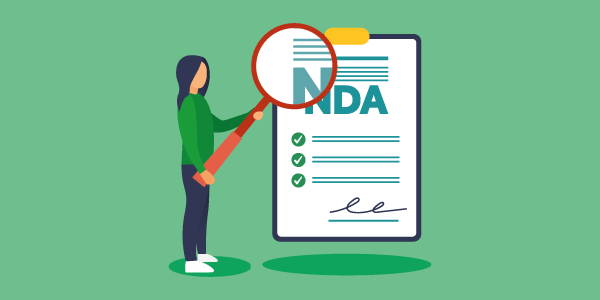
When you're discussing your next business move with a third party, you want them to keep your confidential information, well, confidential.
That's where NDAs (non-disclosure agreements) come in. But how can they help, and when do you need them? We asked our friends at Sparqa Legal to help with some advice. Here's what they said…
Knowing when and how to ask for an NDA (also known as a non-disclosure agreement, confidentiality agreement or confidentiality undertaking) is an essential part of running a successful business.
NDAs should be used whenever you're disclosing confidential or sensitive information to a third party. They prevent people or companies who have signed them from disclosing information without your permission or using it for the wrong purposes. It's essential to arrange for an NDA to be signed before revealing any confidential information. Otherwise, it can be hard to enforce. For instance, you might be discussing a business collaboration, negotiating with commercial partners, or selling your business. And you want to make sure the information isn't made public.
What's an NDA?
An NDA (non-disclosure agreement) is a legal agreement that protects your confidential and sensitive information from being misused by the person receiving it.
By requiring the recipient of your confidential information to sign an NDA, you can
- authorise specific purposes they can use the information for
- direct them to keep the information confidential from others
- require them to give back or destroy the information at your request.
NDAs can be mutual (where you and the recipient both have confidentiality obligations to each other) or one-way (where most of the confidentiality obligations are placed on the recipient).
What types of situations require an NDA?
You should ask a third party to sign a non-disclosure agreement when disclosing any confidential or sensitive information. This can include your business plans, intellectual property and know-how, customer and supplier details, and financial records. NDAs are common in scenarios such as
- dealing with potential business investors
- engaging new contractors, suppliers or other commercial partners
- beginning a new project
- if you're creating a new product or inventing something.
When creating a new product, an NDA is particularly important. This is because if you disclose information about a new invention without having a non-disclosure agreement in place, you could potentially lose the right to patent that invention later.
When thinking about an NDA, consider the type of information you're looking to protect and whether you can justify a non-disclosure agreement. For example, an NDA can't cover information already publicly available.
Also, consider who the third party is. You might be interviewing for a new role, and the position is relatively junior. In this case, it may not be appropriate for the interviewee to sign a non-disclosure agreement. However, you might want an NDA for a more senior position or if you're negotiating a business collaboration.
When should I get a non-disclosure agreement signed?
It's essential to have a signed NDA in place before you disclose your confidential or sensitive information. Otherwise, it can be a challenge to prove you intended the information to be confidential and more difficult to do something about it.
Bear in mind, even if you have a signed NDA in place, it's still a good idea to be cautious about disclosing any particularly sensitive information. It can be expensive and time-consuming to enforce an NDA in court. By having a signed NDA in place before you start any discussions, you're making people aware that information is confidential. This can act as a deterrent against disclosing or misusing your information.
What should I do if someone refuses to sign an NDA?
You need to consider if you'll provide confidential information or not if someone refuses to sign an NDA. This will be a commercial decision for your business. You should balance the sensitivity of the information with the importance of the meeting or negotiations.
You may decide it's too risky without an NDA in place and stop discussions. Alternatively, you could choose to go ahead with the meeting or negotiations but hold back some more sensitive information until you're comfortable with the people there.
Be aware some businesses have a blanket policy of refusing to sign NDAs. For example, crowdfunding platforms often state they'll not sign them.
If someone refuses to sign a one-way NDA consider offering them a mutual one instead. This can help build a relationship of trust as it shows you'll also keep their information confidential.
What other steps can I take to protect my confidential or sensitive information?
As well as putting an NDA in place, there are other steps you can take to protect your business information and goodwill. You can register trademarks, inventions and designs that give your branding, products and inventions broader protection. And you can take specific steps to record copyright in your creative work.
Even with an NDA in place, it's best to disclose only the minimum amount of necessary information. This minimises the risk of needing to spend time and money enforcing your NDA.
The content in this article is up to date at the date of publishing. The information provided is for information purposes only and is not for the purpose of providing legal advice. ©Sparqa Limited 2021. All rights reserved.
Image used under license from Shutterstock.
guest posts and interviewsmanaging riskrunning a business
